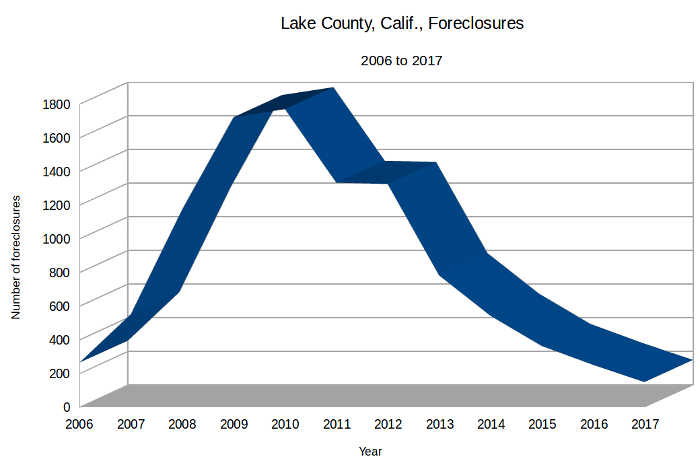LAKE COUNTY, Calif. – Lake County’s newest crop report showed local agriculture’s value continues to climb, with salvage timber from the recent wildland fires causing a spike in timber valuation.
Agriculture Commissioner Steve Hajik completed and presented the 2016 Crop Report in December.
He said the completion of the report was delayed by a staffing shortage.
The 2016 report puts Lake County’s agriculture valuation at $113,829,790, the highest number recorded so far, he said. It’s a 12-percent increase from 2015.
Hajik said the rise in valuation can be attributed to an increase in the value of the winegrape and and timber industries.
“Grapes are growing, pears are stabilizing and walnuts are falling,” he said in summing up the main findings about Lake County’s key agricultural crops.
The 2016 report showed the gross value of Lake County’s winegrapes was $78,643,584, an increase of 24 percent from 2015. The total tonnage was 46,528, and the total grape acreage was 9,420, an increase of 635 acres. Hajik said the tons per acre increased by 15 percent and the average price per ton increased by 3 percent.
Hajik said pear tonnage was down in 2016, but acres held steady.
The gross pear value in 2016 was $20,849,889, a decrease of 21 percent from 2015. Hajik found that the total production decreased by 8,114 tons, and the price per ton increased slightly. The pear acreage remained the same at 2,034 acres.
Walnuts showed one of the more dramatic drops in crop value in 2016. Hajik said the 2016 gross value of walnuts was $3,674,529, a decrease of 32 percent. The price per ton decreased
by 31 percent and acreage decreased by 100 acre, with production also down slightly.
“My gut feeling is, walnuts are being pulled for vineyards,” he said.
The most notable change in valuation came in timber production, which went from $28,447 in 2015 to $5,101,380 in 2016 due to salvage logging, according to Hajik’s report. That’s a 17,223-percent increase.
But Hajik said it doesn’t account for a resurgence of Lake County’s timber industry, which he said isn’t healthy.
“What’s going on there is there’s a salvage timber operation going on,” he said.
“They can’t get good prices on timber,” he added. “There’s a glut, which is unfortunate.”
Most of the Valley fire salvage timber is going overseas, Hajik said.
With the recent fires around the North Coast, Hajik said timber industry professionals are anticipating a possible increase in Douglas fir prices this year.
Greg Giusti, advisor and director emeritus of forest and wildlands ecology at the University of California Cooperative Extension, also attributed the “blip” in timber numbers to the timber sold following the Valley fire.
Lake County, Giusti explained, has been producing around one million board feet for some time, “but the fire caused many, including the state, to sell salvaged logs. I think we’ll see another blip for 2017.”
He said most of the logs from Boggs Mountain Demonstration State Forest – the bulk of which were pine – went to local mills, and the Mendocino Redwood Co. bought most of the logs from the state forest.
“I’d say most, if not all, of the logs from private lands were exported to China. The Chinese use wood to make concrete forms,” which Giusti said is their chief building method.
As for use of the lumber, Giusti said ponderosa pine lacks the strength for structural construction, while Douglas fir can be used for houses and other structures.
The 2016 Crop Report also noted increases in field crops, 14 percent, and miscellaneous fruit, 3 percent, while decreases occurred in nursery production, 37 percent; livestock production, 18 percent; vegetables, 22 percent; and livestock and poultry products, 6 percent.
One of Lake County’s biggest crops – marijuana, or cannabis – isn’t accounted for in the report, and isn’t likely to be for the foreseeable future, Hajik said.
While the California Department of Pesticide Regulation considers cannabis a crop, the US Department of Agriculture doesn’t recognize it as a crop currently, which in turn has caused the the California of Food and Agriculture not to formally recognize it, he said.
“It’ll happen eventually,” he said.
Hajik said he and his staff will plan on starting the 2017 Crop Report in March, with hopes that it will be completed by June.
Email Elizabeth Larson at This email address is being protected from spambots. You need JavaScript enabled to view it.. Follow her on Twitter, @ERLarson, or Lake County News, @LakeCoNews.
2016 Lake County Crop Report by LakeCoNews on Scribd

 How to resolve AdBlock issue?
How to resolve AdBlock issue? 























